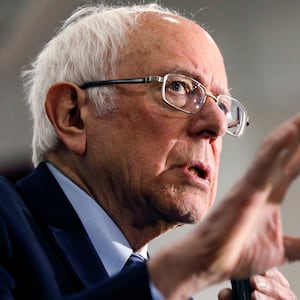In the lead-up to the November presidential election, People’s Action, a grassroots coalition, hired a dozen former staffers from Sen. Bernie Sanders’ (I-VT) campaign to discuss the merits of populist economic proposals with voters in conservative and swing states.
The organizing network, overseen by Sanders alums, quickly ballooned to include some 30,000 volunteers eager to test how far President Joe Biden and Democrats in Congress would be willing to go to make their pledge to raise the minimum wage a reality. For the first time in well over a decade, progressives believe it’s within striking distance.
“This isn’t the typical pitch,” said George Goehl, the group’s executive director. “We’re intentionally calling people who are struggling. We’re actually taking on the project of not just calling the choir.”
People’s Action is not operating in isolation. The outfit is part of a broader web of activist leaders eyeing chances to wield political influence with the White House and on Capitol Hill. Unlike the first two years of the Obama administration, when Democrats controlled both chambers of Congress but acquiesced to many moderate and Republican demands, newly emboldened progressives say that they are now bigger, bolder, and better organized. And they have started flexing their expanding power in public and private around issues where they think some in their party may cave.
Minimum wage is the first big trial, according to interviews with nearly a dozen Democrats across the ideological spectrum.
In 2015, Sanders called for increasing the baseline federal wage figure from $7.25 to $15, effectively standing alone among major party fixtures, including Hillary Clinton, who favored a more modest position. Just a few years later, in the following election, nearly all of the presidential candidates angling for the nomination had backed the idea. During his first appearance on the campaign trail in April 2019, Biden called himself “a union man” and proudly touted the $15 hourly goal.
During the introductory weeks of the Biden administration, the issue is now at the center of discussion in Congress after Speaker Nancy Pelosi (D-CA) announced that the $1.9 trillion COVID-19 relief package she intends to deliver to the Senate will include the wage provision. “Yes, we are very proud of that,” Pelosi said during a press briefing on Thursday.
For weeks, progressives had sternly cautioned that outrage would ensue if the measure was cut from the coronavirus plan. Having promised to get it done as the leading presidential aspirant, Biden’s adoption of the $15 target was one of the strongest persuasion points to rally Sanders supporters behind him, according to a source familiar with the dynamics at the time. The two former rivals have enjoyed a close relationship during Biden’s first weeks in office.
What’s now at stake, top progressive lawmakers say, isn’t just the left’s credibility with voters; it’s the entire party’s. “Democrats need to deliver on a minimum wage increase,” Rep. Ro Khanna (D-CA), who co-chaired Sanders’ campaign in 2020, told The Daily Beast. “We have been campaigning on it for so long and it’s time to prove we can deliver.”
Anticipating what many believe to be only one bite at the apple, congressional progressives like Sanders are working backchannels to get their messaging across to the White House and top members in the House and Senate who they see as allies during a potentially drawn out process.
“Sanders’ office was in communication with different leaders, the White House, with House progressives, and that ultimately was a powerful indicator of the momentum that we’re building,” said a Sanders Senate aide. “Playing with live bullets and sending it over to the Senate is a significant indicator of caucus cohesion on this.” A separate senior Democratic congressional aide said upwards of 50 people joined a conference call this week from labor, business, and workers’ rights communities to discuss the $15 fight.
Another top Sanders ally on Capitol Hill, Rep. Mark Pocan (D-WI), said he’s been involved in “lots” of conversations with the White House, congressional leadership, and staff about the minimum wage push. He called it “one of the highest priorities” in the rescue plan.
“Congress has been extremely remiss in not dealing with this for 11 years,” Pocan told The Daily Beast, referring to the last time Congress raised the federal minimum wage. “Our ineptitude has made it so that more people live in poverty… we feel this is one of the most important things you can do in COVID relief, and it’ll have an ongoing impact after COVID is done.”
Majority Leader Chuck Schumer (D-NY), for his part, now appears to be more amenable to a possible wage increase and other progressive priorities with direct economic ramifications, according to two sources. “The impression is Schumer has given Bernie a lot of latitude to make this work,” said one Democratic Senate aide.
The New York Democrat, taking the reins of the Senate majority for the first time, has recently embraced a series of positions at the vanguard of the left wing. He faces re-election next year, with many in the state openly speculating that Rep. Alexandria Ocasio-Cortez (D-NY) could challenge him in a primary.
In a press conference earlier this month, Schumer joined highly visible members in the House to encourage the Biden administration to be more aggressive about canceling federal student loan debt. “He’s so available now,” Goehl said. “To grassroots and organizing groups, it’s pretty amazing.”
The tougher audience for progressives fighting for the wage increase has not been Schumer, but a cluster of moderate Senate Democrats. One of them, Sen. Kristen Sinema (D-AZ), told Politico on Friday that she opposes the $15 wage hike as part of the rescue plan, despite previously backing it in 2014. All it takes is for one Senate Democrat to vote no for the entire package to fail in the evenly-split chamber.
Another obstacle is that the legislative tool that Democrats are using to fast-track the bill, budget reconciliation, is governed by arcane, specific rules about the kinds of provisions that can and cannot be passed through the process. A key component is that a bill passed through reconciliation must not contain “extraneous” items—defined as provisions that don’t affect the federal government’s revenues or spending. The minimum wage increase does not obviously meet that test, and Democrats have been divided about whether it ultimately can. Biden himself has openly suggested that the proposal may ultimately get stripped out.
“It’s hard to read Sinema’s comments and say there’s going to be a way to do this in the end,” said a Democratic aide, who added that Democrats could approve a tax incentive for businesses to increase their wage. Such an option is seen as a reconciliation-friendly way for Democrats to take at least one step forward on raising wages.
As they work to finalize the legislation, Democrats intend to get the wage language into the text, no matter what its prospects are of surviving reconciliation. But even if it does, Senate insiders say Sinema is hardly the only one in the caucus to oppose including the increase.
Another Democratic aide predicted that 10 to 15 Democratic senators could vote against it “if it somehow gets into the final bill.” The aide also expected the measure to come to a vote on the Senate floor even if it is cut in the budget reconciliation process, possibly as a standalone, as a nod to Sanders and the progressive wing of the caucus.
To that end, Senate and House sponsors re-introduced the Raise the Wage Act with a majority of Democratic co-sponsors on Thursday. And recent public polling indicates the issue also has bi-partisan support. A survey released by the National Employment Law Project and Hart Research found that 62 percent of respondents polled in the 67 “most competitive” congressional districts supported a phased-in increase to eventually hit $15.
This week, the Congressional Budget Office, which analyzes the fiscal impact of legislation, predicted that the Raise the Wage Act could give at least 17 million people a raise and lift 900,000 out of poverty. But the CBO also found that 1.4 million jobs would be lost if the wage is increased to $15 by 2025, a point that conservatives noted in reiterating their opposition to the idea. Sanders and some of his top allies held up the report as clear proof that the wage increase could survive reconciliation because the CBO found it would add to the budget deficit.
Larry Cohen, executive director of Our Revolution, a Sanders-aligned membership organization, pointed to the apparent traction under unified Democratic control in Washington. In particular, he noted the roles Rep. Pramila Jayapal (D-WA) and Rep. Andy Levin (D-MI) played in the Congressional Progressive Caucus to help ensure the provision remained in the House version that’s headed to the Senate. Jayapal is the head of the caucus and Levin has an extensive background in organized labor.
“The real difference here is the Progressive Caucus is actually acting like a real caucus. This is the first time ever,” said Cohen, explaining his group’s strategy of working from the outside with the CPC, and, by extension, the White House. “There is no next time. If this isn’t done in budget reconciliation it’s not going to get done at all.”








